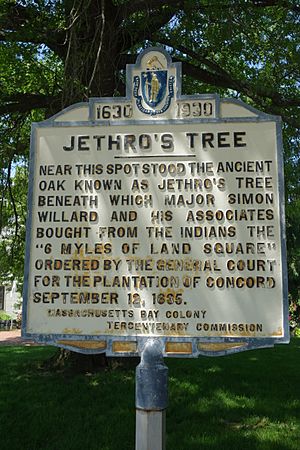Simon Willard (Massachusetts colonist) facts for kids
Quick facts for kids
Simon Willard
|
|
|---|---|

Monument commemorating Simon Willard's role in forming Concord
|
|
| Born | April 7, 1605 Horsmonden, Kent, England
|
| Died | April 24, 1676 (aged 71) |
| Occupation |
1636–1654: Concord Representative, Massachusetts General Court
1640s–1650s: Advistor to the Nashaway Company, founder of Lancaster, Massachusetts
1654–1676: Assistant and Councillor
1676: Major in King Philip's War
|
| Spouse(s) |
Marye Sharpe (1614–1634)
(married October 13, 1628) Elizabeth Dunster (1635–1651)
(married 1651) Mary Dunster (1630–1715)
(married 1652) |
Simon Willard (1605–1676) was an important person in early Massachusetts. He was a fur trader, a leader in the local army (called a colonial militia), a lawmaker, and a judge. He helped shape the early days of the Massachusetts Bay Colony.
Contents
Who Was Simon Willard?
Simon Willard was born in Horsmonden, Kent, England. He was baptized on April 7, 1605. In 1634, he moved to Cambridge, Massachusetts with his first wife, Mary Sharpe, and their two daughters.
Helping Start New Towns
Simon Willard was one of the founders of Concord, Massachusetts. He worked as the town clerk from 1635 to 1653. He also helped buy the land for Concord from the Native American people who lived there.
Willard represented Concord in the Massachusetts General Court. This was like the government's main assembly or parliament. He served there from 1636 to 1654. Later, he became an assistant and councilor, serving from 1654 to 1676.
He also advised the Nashaway Company. This company helped found Lancaster, Massachusetts, in the 1640s and 1650s. Simon Willard himself moved to Lancaster by 1660. In 1651, he marked out 1,000 acres of land for new settlements. This land was along the Assabet River.
Working with Native American Tribes
Simon Willard worked as an advisor to the Nashaway Indians. He even provided them with guns, as ordered by the Massachusetts General Court. In 1654–55, Willard led a group against Ninigret in southern New England. He moved some Pequot people who were under Ninigret's care. He placed them with the Niantic leader Harman Garrett in what is now Westerly, Rhode Island.
A Leader in Times of Conflict
In 1676, at 70 years old, Simon Willard served as a major in King Philip's War. This was a major conflict between colonists and Native American tribes. He was the main military officer for Middlesex County, Massachusetts. He successfully fought off a Nipmuc force that was attacking Brookfield.
Simon Willard also became a magistrate, which is like a judge. He died on April 24, 1676, in Charlestown, Massachusetts. He was 71 years old and was holding court when he passed away.
Founding Old Saybrook, Connecticut
Simon Willard is also known as one of the founders of Old Saybrook, Connecticut. In 1635, he was a Sergeant. He and Lieutenant Edward Gibbons were sent by John Winthrop the Younger. John Winthrop the Younger was the son of John Winthrop, who was the Governor of the Massachusetts Bay Colony.
Their mission was to take control of the mouth of the Connecticut River. On November 24, 1635, they landed on the west bank of the river. They found a Dutch symbol there and replaced it with an English shield. The group then built a small fort with a cannon. When the Dutch returned, they saw the English fort and left. This fort was one of the first military bases in the Connecticut Colony.
His Legacy
The Willard Elementary School in Concord, Massachusetts, is named after Simon Willard. A ship, the Liberty ship 0743 Simon Willard, was also named in his honor.
 | Isaac Myers |
 | D. Hamilton Jackson |
 | A. Philip Randolph |

